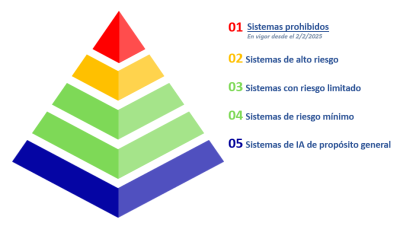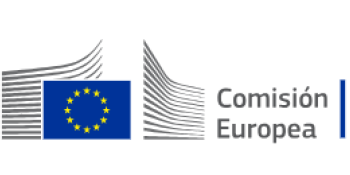
Regulation (EU) 2024/1689 is the first legal standard in the world on artificial intelligence. It entered into force on 1 August 2024 and aims to ensure that artificial intelligence (AI) systems are developed and used responsibly, that is to say that they are safe, ethical and reliable while ensuring a high level of protection of health, safety and fundamental rights as enshrined in the Charter of Fundamental Rights of the European Union.
The standard classifies artificial intelligence systems according to their risk and imposes obligations on suppliers and those responsible for deploying AI technologies in the EU’s single market. In addition to addressing potential risks, the regulation also promotes innovation and encourages the adoption of ethical and sustainable AI.
| O1 Prohibited systems: | ||
| AI systems seen as a threat to people’s safety, rights or livelihoods.Example: cognitive behavioral manipulation. | ||
| O2 High risk: | ||
| AI systems that will have to meet strict obligations and requirements to access the European Union market.Example: autonomous driving |
||
| O3 Limited risk: | ||
| AI systems allowed, but must meet certain transparency obligations so that users know they are interacting with an AI. Example: chatbot. | ||
| O4 Minimum risk: | ||
| AI systems with minimal risk (the vast majority) that are not regulated and will be available as before. Example: videogames. | ||
| O5 General Purpose AI Systems: | |
| They are systems based on an AI model that has the ability to perform very diverse tasks and can be integrated into a wide variety of subsequent applications from generating texts to recognizing images. General-purpose AI models that present systemic risks must meet higher standards. |
To ensure proper implementation of the Regulation, several governing bodies are set up:
|
|
AI office within the European Commission. | |
|
|
Group of independent scientific experts. | |
|
|
AI committee made up of representatives of the Member States. | |
|
|
Consultative forum for interested parties. | |
|
|
Market surveillance authorities in each Member State. |
The regulation lays down penalties for breaching the rules:
|
|
a percentage of the total turnover of the enterprise in the previous year or, | |
|
|
a certain amount. |
SMEs and startups face proportionate fines
AI Act also promotes investment and innovation in AI within the EU and aims to facilitate the development of a single market for AI systems.

In our News section you will find information about the most relevant events, talks and conferences in the field of artificial intelligence.

Practical guides for compliance with the Artificial Intelligence Act

Questions and answers about the AI ACT: Article 50
We use third-party cookies for analytical purposes, in summary we only use Google Analytics cookies to analyse our traffic.